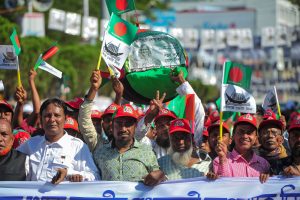The first week of August witnessed the fall of Sheikh Hasina’s 15-year-long brutal and dictatorial regime in Bangladesh. As many as 542 people were killed in a 20-day-long violent uprising that forced her to flee to India in a military cargo plane.
But long before that, Sheikh Hasina and her party led a kleptocratic government that, according to newspaper reports, helped its cronies siphon some $150 billion out of the country. That is double the amount of the country’s national budget.
Hasina’s Awami League rigged one general election after another. All the democratic institutions have been destroyed and generations of young people grew up without exercising their voting rights. Surendra Kumar Sinha, Bangladesh’s first Hindu judge, accused the country’s military intelligence, the Directorate General of Forces Intelligence (DGFI), of forcing him to resign for giving a verdict that nullified a constitutional amendment.
The Awami League not only destroyed the country’s judiciary and other democratic institutions – on numerous occasions, Bangladesh Chhatra League (BCL), the Awami League’s student wing, has been accused of murder, rape, torture, extortion and forced prostitution. It is a small wonder that the Monsoon Revolution, which Bangladesh’s lone Nobel Laureate Muhammad Yunus has called the country’s “second liberation,” has been spearheaded by the youth who were at the receiving end of the BCL’s abuse. One of the demands that the students made at the beginning of their movement was the banning of the BCL from all educational institutions.
Hasina’s grip on the country was absolute. So was her hold on the Awami League – she has been the party’s president for around 44 years. Bangladesh’s median age is 26; for the vast majority of the public, then, Hasina is synonymous with the Awami League.
It has only been a few weeks since Hasina’s fall, and emotions still run high when it comes to her legacy. On August 15, the 49th anniversary of her father Sheikh Mujib’s assassination in a bloody coup, Sheikh Hasina called on her supporters to “offer floral tributes and prayers at the Bangabandhu Memorial Museum” in downtown Dhaka. This prompted many to believe that the Awami League is trying to make a comeback.
Sarjis Alam, a leader of the student movement, has alleged that the Awami League is trying to incite a counter-uprising. On August 15, the day Hasina told the Awami League to mourn her father’s death, Alam told a gathering, “If the people believe that the Awami League should not have the right to engage in politics here, we will raise that demand on their behalf.”
Within days, a writ was filed in the High Court seeking the ban of the Awami League and the cancelation of its registration as a political party.
It is ironic that the Awami League, which faces a possible ban now, had itself banned Jamaat-e-Islami, the country’s largest religious party, only four days before the fall of Hasina. That ban on Jamaat is ineffective in post-Hasina Bangladesh. Hours after Hasina left the country, Bangladesh’s president held a meeting with the chiefs of the Bangladesh Armed Forces and all major political parties to decide the fate of the country, and Jamaat’s leader was invited.
During Hasina’s rule, five Jamaat leaders were hanged for war crimes and crimes against humanity during Bangladesh’s Independence War, and the Hasina government launched a crackdown on the party. Despite this, Jamaat could not be destroyed. One of the main reasons for its persistence is because Jamaat enjoys some pockets of support in the country – it has never bagged less than 4.6 percent of the vote in an election it has contested.
The same goes for the Awami League – four years after its leader Sheikh Mujib was brutally murdered, the party won around 25 percent votes. That support rate might be less now, as the party is despised and is widely seen as fascist. But banning the party is not the answer. The Awami League may still enjoy the support of 15-20 percent of Bangladeshis, which is around 24 million people, as big as the total population of Australia. Disenfranchising a large number of people might not bode well for Bangladesh’s democratic transition. The party can resurface under a different name anyway.
However, the Awami League has to go through reform. The culture that has bred fascism in its rank and file needs to be eradicated. The future of the party, which had been at the forefront of Bangladesh’s first independence movement, is hanging by a thread. Its old guard need to pave the way for a new, young leadership to come out of this disaster that the party, through corruption, misrule, and abuse of power, has brought upon itself.
Bangladesh has to undertake legal reforms so the next elected prime minister is not able to amass autocratic power. It has to make sure no party can usurp power through rigged elections the way the Awami League has done. All corrupt Awami League leaders must be brought to book, and there’s also the far larger issue of the trial of those who have denied people their voting rights and have committed crimes against humanity. Bangladesh’s new government can set up a separate tribunal for this. It will encourage the party’s clean leaders – if and when they are found – to vie for the party leadership.
The Awami League has to reform itself, and if it can’t do it quick, in Gen Z terms, it’ll get canceled.

































